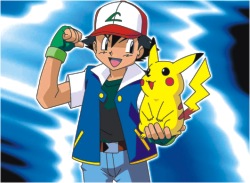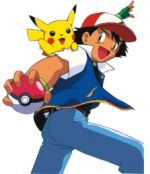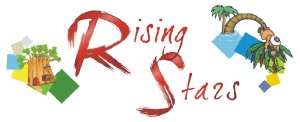 The
Pokèmon Phenomenon
The
Pokèmon Phenomenon
By
Tawsif
I magine a world
abundant in gaudy colours, where juveniles, instead of aspiring to
become rock-stars or something like you'd expect them to, go around
chasing unusual creatures and aspire to become their traders. Now,
add a bunch of silly 'pocket monsters' which have to be trapped inside
shiny, little balls, so that they can slip out of your grasp and drop
into the river just when you happen to need them the most. Add some
stereotyped dialogues. And, voila, you get Pokèmon, the flamboyant
Nintendo-extravaganza that has set fire to the hearts of the naive,
little kids all around the globe.
The introduction
of the Pokèmon game in 1996 paved the way to the pretentious
Pokè
mon craze, which is yet to reach its zenith. Money was there to be
made, and the shrewd businessmen out there didn't miss out on the
opportunity. They trailed the success of the game with Pokèmon
animé series and the collectible Pokè
mon Trading Card Games. Soon, Pokèmon cards were introduced
to the market, and the kids bought them like crazy. In a matter of
months Pokèmon turned into a multi-billion dollar enterprise,
thanks to the utter innocence or should we say gullibility of the
juveniles.
It didn't stop
there. A Pokèmon movie was made, followed closely by two sequels,
all of which were blockbusters, and the Pokè-mania skyrocketed
even further. Some avid gamers complained that the animé series
and the movies looked rather silly, since they lacked in the ruthlessness,
not to mention the authenticity of the Pokèmon -antagonists,
the Team Rocket. After all, in the games the Team Rocket happens to
be a dangerous and widespread source of crime. While in the animéthey
only comprise of three characters- a dumb looking Jessie, a dumber
James, and a talking (hence, even more irritating) Pokèmon
called Mewtwo. In almost every episode the 'deadly' trio tries to
steal either Pikachu or any other Pokè
mon belonging to Ash, and in the end are always sent flying into the
distance, often due to Pikachu's Thunderbolt attacks or yet another
mechanical failure in whatever weird-machine they'd been piloting.
They always mark their departure with the typical "Looks like
the Team Rocket's blasting off again" dialogue.
If you're smart
enough, you don't need to watch each and every episode. After all,
they always have the same plot.
 Perhaps
it's the lack of quality shows for the kids or perhaps it's because
kids tend to fall for anything and everything which looks cute and
makes a lot of unnecessary noise, or maybe it's all the 'stuff' they
bring with them. Pokèmon has a huge influence on the youngsters
all around the globe. Our country is no different.
Perhaps
it's the lack of quality shows for the kids or perhaps it's because
kids tend to fall for anything and everything which looks cute and
makes a lot of unnecessary noise, or maybe it's all the 'stuff' they
bring with them. Pokèmon has a huge influence on the youngsters
all around the globe. Our country is no different.
With Cartoon Network
airing the Pokèmon animé series, Pikachu and friends
are gaining vast popularity in our country. The kids in Dhaka are
already addicted to the Pokè mon cards, and the ill-fated parents
are paying the price. Often, the teachers are facing troubles in the
classroom due to too much fuss being made over the Pokèmon
cards.
Of course, we
ourselves used to throw tantrums in our times over GI Joe's and the
lot. Then again, we were always content with half a dozen of GI Joe's.
We never wanted to buy them in the hundreds!
According to the
CNN archives, Pokèmon had been reported to have a rather pernicious
effect on certain ill-fated kids. In Turkey, Seda Aykanat, a seven-year-old,
jumped off her fifth-floor balcony, apparently believing that she
was a Pokè
mon with superhuman powers. She was the second child in Turkey to
do so.
The
Health Minister of Turkey asked the health experts to study the effect
of the Pokèmon 'cartoon' on children. The experts concluded
that Pokèmon confused the children and distanced them from
reality. The cartoon (or animé ; I don't care) was banned in
Turkey for a significant period of time.
Of course, Pokèmon
DOES teach the children the merits of friendship and teamwork. Then
again, so does Captain Planet and most other cartoon-shows made for
the kids. They don't have so much controversy, do they?
In a nutshell,
Pokèmon is nothing but a dumb animé (or cartoon; whatever)
which has captured the hearts of the gullible youngsters through utter
flamboyance; there's nothing cool about that. Making a colossal fuss
about it will only convince the juveniles into believing the bizarre
facts depicted in the animé
, hence confusing their minds.
 Unless
you've been abducted by aliens in a mass conspiracy to subvert the
human race (in which case refer to other more paranoid TV show) the
chances are that you've heard of the new rage that's running hotter
than the sun right now.
Unless
you've been abducted by aliens in a mass conspiracy to subvert the
human race (in which case refer to other more paranoid TV show) the
chances are that you've heard of the new rage that's running hotter
than the sun right now.
Just in case you
HAVE been otherwise occupied for the past eight years, I'm talking
about Pokèmon. There. That got you sitting straight, didn't
it?
Pokèmon
is the brainchild of Satoshi Tajiri, who in early 1984 decided that
the then recently introduced Gameboy was the next ultimate thing,
especially because it came with a data cable and allowed two Gameboy
users to communicate and "exchange" as he puts it himself.
The world of Pokèmon on the Gameboy made the gamer go out and
capture, raise and exchange their "Pocket Monsters" with
other players, thereby gaining new Pokèmon. Of course, to children,
Pikachu and friends brought a whole new world to explore and a whole
new genre of interests.
The Pokèmon
games were first released in 1996 (Pokèmon Red and Green) and
the trading card game soon after. The TV show started airing in Japan,
and caught on like wildfire. Then, in 1998, Pokèmon exploded
into the USA with the release of the first Pokèmon Movie, "Pokèmon:
Mewtwo Strikes Back" and the subsequent invasion of the state
of Kansas by Nintendo's latest and greatest creation. The Pokè
mon TV show started airing in September, the trading card games sold
on like crazy, and the rest is history.
In Bangladesh,
of course, Pokemania began with the TV series on Cartoon Network.
Our hero, Ash Ketchum and his brave Pokèmon trainer friends
set off on their Pokèmon trainer quest making new friends and
saving people, Pokè mon and anyone else on the way. Of course,
capturing the odd Pokèmon and overcoming the trials of a great
battle or two and surviving the evil plans of Team Rocket to steal
Pikachu (undoubtedly because it's just the cutest thing ever, though
its amazing lightning powers probably help) just happens to be part
of the bargain. That's never stopped heroes before, has it? And, of
course, you've "gotta catch them all!" (for the uninitiated,
the 150 Pokèmon originally released and any special ones that
might tag along).
What is it about
Pokèmon the TV show that's fired the hearts of kids in Dhaka?
It's an awfully kiddy show (the mighty Pokè
mon say their names over and over again?) and Ash probably has the
worst dress sense of any hero since Speed Racer. And, to top all of
that off, there's the truly sad excuse for a bumbling villain team
- Team Rocket.
But that doesn't
really matter, does it? Pokèmon's not about flashy action,
or incredibly rough language, or anything of the sort. Pokè
mon TV is about.... first and foremost... friends. The relationship
between Pikachu and Ash, for example, is the one of the simplest and
most telling stories of trust pulling people together and overcoming
odds that you'll ever see. The other Pokèmon manage to give
off this same message of together-against-the-odds and of teamwork
over everything. Which is pretty cool, no matter how old you are.
Then there's the
people of the show growing up. Ash is quite the hero type, but fans
get to actually see him as he turns more and more into an actual role-model
as he goes along; his courage and his taking risks for his friends,
and the faith he shows in his friends. Which is not to say he doesn't
have his flaws (as does everyone else) but kids CAN relate to that.
I know I can.
Pokèmon
also brings out the collector in kids. Which, of course, has been
a controversy of sorts, seeing as how kids have been known to throw
tantrums for cards (which is something I find silly to mention, because
we've all thrown tantrums for GI Joe's in our days, and Tintins, and
all that too), but on the whole it's a whole new arena for people
to bond in. Not just pre-teens, too, because there've been reports
of people buying 1000 tickets to the movie premieres to get the ULTRA-RARE-HOLOGRAM-CARDS
that were out on promotion.
You have got to
catch them all. And that's what it all boils down to.
Having
said which, Pokèmon is here to stay. And it's a good thing,
too. Besides the fact that its global exposure to Japanese culture,
it's also been responsible for teaching teamwork and friendship to
kids and sell stuff that has Pikachu on it anywhere in the world.
Single handedly raising the cuteness factor all around the planet.
Now THAT's cool.
By
Lancer
